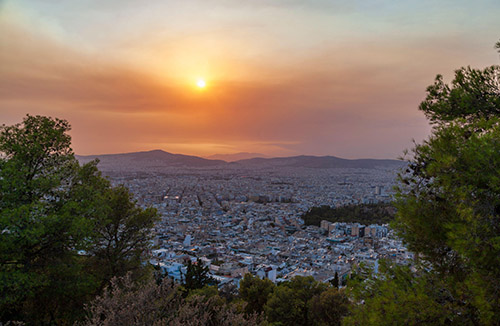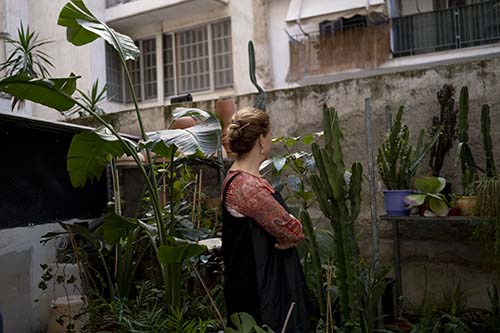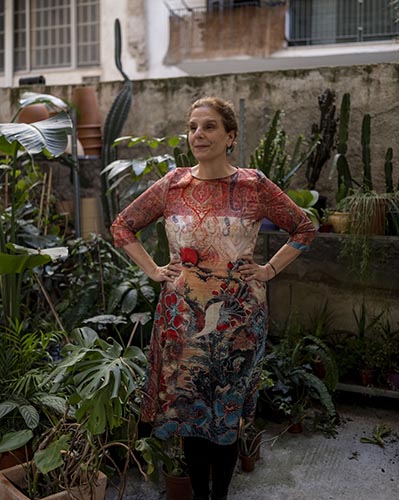When our interview at an Athens café draws to a close, Eleni Myrivili, Europe’s first chief heat officer (CHO), offers me a ride around the square in her new electric car. It resembles a box on wheels, and two people can barely fit inside without rubbing shoulders.
Before we part ways, I ask her how she charges the battery in a city where charging stations are scarce. “At home,” she responds casually, as if it’s a mobile phone, adding with enthusiasm: “Isn’t it great?”
With only a few chief heat officers worldwide so far, there’s no typical task list, but their biggest job is to help cities plan for extreme heat and co-ordinate actions enhancing urban heat resilience. Shortly after Myrivili’s appointment in 2021, Athens experienced a severe heatwave, and wildfires raged close to the city, making her realise just how bad things could get.
“There was smoke, the sky was red and you couldn’t breathe; you felt like your lungs were burning,” she remembers, adding that heat can also be a silent killer, causing life-threatening conditions such as heart attacks.
“It’s a different kind of heat – longer, more frequent and much hotter,” she says about global warming-induced heat, specifically in cities. “Our bodies are not made for this; we still don’t know the physiology of what happens.”
Myrivili has just finished up transitioning out of her role as Athens’ heat guru and she is about to step into a new role – global chief heat officer to UN habitat, where she will be supporting cities in 60 countries in their efforts to tackle extreme heat. She says she is proud of the innovations that have turned Athens into a pioneering heat-fighter during her tenure.
As the city’s CHO, she served as the point of contact between Athens and the Adrienne Arsht-Rockefeller Foundation Resilience Center – a US think tank that helped establish the CHO role and has advocated for it worldwide – and as a conduit for different initiatives pioneered by ‘Arsht-Rock’ as it’s more commonly known.
One of them was classifying heatwaves particular to Athens into different categories. By juxtaposing temperatures with historical mortality data, the city created an algorithm that can forecast the impact of heatwaves and warn the vulnerable population about associated risks.
“We have cities that worked for a pre-climate change era, not the kind of weather we will be dealing with”
Myrivili is not the world’s first CHO. That honour goes to Jane Gilbert, who took up the role in Miami in the spring of 2021. But Myrivili wasn’t far behind. Not long after Gilbert landed the job, Arsht-Rock suggested that Athens could be the first European city to appoint a CHO.
Athens mayor Kostas Bakoyannis, who has led the city’s conservative government since 2019, put Myrivili forward for the position and, in July 2021, she took up her post. At the same time, Eugenia Kargbo accepted the job as Africa’s first CHO in Freetown, Sierra Leone.
‘Myrivili’ is a name that conjures various images in the Greek mind, from secondary-school textbooks, to mud and rifles. Her grandfather Stratis Myrivilis was a giant of Greek literature, thrice-nominated for the Nobel prize. His most famous novel, Life in the Tomb, depicts life in the trenches of the Macedonian front during the First World War.
His granddaughter is ambivalent about his influence on her upbringing. “There was a seriousness about it. I was conscious that I was carrying a legacy that I wasn’t ready for,” Myrivili says.
Her education started with degrees in theatre and performance arts, followed by a PhD in anthropology, which she says helped her learn how to communicate with people.
“All my work starts with talking to people,” she says. Indeed, her politics have always focused on stakeholder engagement: conversing with Athenians to understand their views on climate change and “check her reality”, as she puts it.
Another passion of hers is science. “I have been an academic, which has helped me process data without being intimidated by it,” she says. “I make sure that whatever I do has a scientific backing.”
 Sunset in Athens with the Greek capital covered by smoke cloud due to bushfires | Photo: Alamy
Sunset in Athens with the Greek capital covered by smoke cloud due to bushfires | Photo: Alamy
It was the wildfires that gripped Greece in 2007, killing 84 people, that prompted Myrivili’s interest in climate change. In the weeks following the fires, she remembers being frustrated by the absence of climate change from public debate.
“There was no discussion about policy, just rumours about people setting fires,” she says. This led to her involvement in Greece’s Green movement in various leadership roles, a period she doesn’t look back on fondly. “It was macho, angry, weird. An unbelievably harsh culture,” she remembers. As a small party with little to no power in Greece, “there was little at stake. And yet people were fighting.”
She thought she would never get involved in politics again, until she read If Mayors Ruled the World, a book by political scientist Benjamin Barber that argues cities and mayors can handle 21st-century problems better than national governments.
“I realised I would like to be involved in local politics and influence things from the bottom,” she says. Following her election to the Athens city council in 2014, Myrivili became deputy mayor and the city’s chief resilience officer, a role created by the local government in partnership with The Rockefeller Foundation, to help Athens come up with solutions to the biggest challenges facing cities, including climate change.
Through a fellowship at Harvard University, she learnt more about ‘urban overheating’, a term used to describe the intensification of climate change’s impact on cities. While urban overheating is estimated to affect more than 13,000 cities globally, there has been little discussion about how we can deal with it, Myrivili says. “We have cities that worked for a pre-climate change era, not the kind of weather we will be dealing with.”
Urban overheating is already severe and could get worse, says Mattheos Santamouris, an energy physicist who specialises in how cities can deal with urban overheating and teaches at the University of New South Wales in Australia.
Models don’t take into account microclimates in cities where temperatures may rise up to 7C by 2050, he tells The Parliament, adding that although it’s good practice for a city to have a chief heat officer, it’s even more important to have a coherent plan to address urban overheating and implement it.
One way to lower urban temperatures, Myrivili says, is to create ‘green corridors’, or interconnected networks of green strips that link a city’s parks. However, she admits this remains a work in progress. In many neighbourhoods, Athenians can only reach the closest park by car.
“We have to think out of the box about mobility. Otherwise we’re screwed”
“The city of Athens is doing a lot communication-wise, but not enough in terms of real work,” says Nikos Charalambides, the head of Greenpeace’s local branch, adding that existing green space is far from enough for a city the size of Athens.
However, he acknowledges that Myrivili has tried her best to change things. “She is phenomenally persistent, but it has been hard for her to persuade the municipality to do the bare minimum,” he says, adding that navigating the bureaucracy of a big municipality like Athens can be a challenge. I
ndeed, Athens has been ranked as one of the least green European capitals in a 2022 briefing by the European Environment Agency.
Water is another priority, given that Athens suffers from prolonged droughts. In partnership with Eydap, the country’s water company, Myrivili has overseen the revival of a Roman underground aqueduct that can help the city irrigate its parks.
“It’s a brilliant engineering feat. It still has water, although it was blocked due to road and subway construction,” she says.
Another innovative plan Myrivili thinks could be replicated elsewhere is ‘sewage mining’ through mobile containers used to clean up wastewater. The reclaimed water is then used for non-potable water needs. “We need to start reusing black water, rather than depleting urban aquifers,” she says.
Although Myrivili’s stint as CHO was relatively brief, she has left her mark on the city’s plans for a greener future. Her legacy is invaluable, notably breaking down bureaucratic silos and making climate change part of the city’s institutional structures, says her successor, Elissavet Bargianni, who has worked with Myrivili and sees her as a mentor.
 Eleni Myrivili, Europe’s first chief heat officer, admires her plants | Photo: Aggelos Barai
Eleni Myrivili, Europe’s first chief heat officer, admires her plants | Photo: Aggelos Barai
Myrivili’s contribution is also acknowledged by Greenpeace’s Charalambides: “Persuading the mayor that [urban overheating] is an issue to be dealt with at the local level was a personal success for Eleni.”
The need to tackle climate change in Athens is all too evident. It’s early spring, and walking around can be challenging with temperatures above 25C. And yet, it’s seen as a fringe issue, Myrivili says. “More people are talking about it, but it’s still not a top priority in Athens and Greece.”
Aren’t younger Athenians more environmentally conscious? Myrivili says that ‘Fridays for Future’, a global youth protest against climate inaction, were not a big thing here. Asked whether the economic crisis of the last decade might be a reason for this indifference, Myrivili nods, adding that the media is partly responsible: “It doesn't even make it into the news. They still see climate as a luxury. They don’t understand that it’s linked with poverty and future jobs.”
Still, Athens can be a trailblazer, she says: “Athens is a great example for other cities, because it’s neither advanced economically nor really poor, and Athenians don’t change their ways easily. So, it’s a great place for experimentation.”
One thing few Athenians are ready to experiment with is doing away with their cars. Although the mayor has tried to make the city more pedestrian-friendly by creating long walkways, little has changed. Myrivili doesn’t mince her words: “Nothing’s going to change in cities like Athens unless we get rid of cars and reallocate public space, creating dense forests where there is asphalt.”
Spurred by the pandemic, many European cities such as Milan and Paris have tried to reduce car traffic and expand cycling and walking space. It’s the kind of policy that doesn’t make a mayor popular, especially among those living in suburbs with scarce public transport.
“It’s difficult for mayors. They need guts to have a serious policy against cars,” Myrivili admits. But that doesn’t stop her. She brings up a dream she had the night before, partly the result of jetlag, she thinks, about using basements to park electric cars that Athenians could freely share.
It’s far-fetched, she admits, but insists: “We have to think out of the box about mobility. Otherwise we’re screwed.”
Dealing with heat is one thing; tackling the inequality that makes its effects graver for those living in poorer areas is harder. “If you look at the city from above, you can tell where the heat-related problems are,” Myrivili says. “Wherever there are fewer green areas, you also have socio-economically vulnerable neighbourhoods. There’s not enough investment in public space, so it gets older and degraded.”
In Athens, these are the central and western neighbourhoods, home to many of the city’s migrant communities and dominated by older buildings that make ‘energy poverty’ a life-or-death matter. Myrivili says that during past heatwaves some Athenians died because they had air conditioners, but no money to turn them on.
“You can eliminate the need for air conditioning if you design houses properly”
In her view, one lesson the pandemic has taught us is the importance of public space. “Cities understood they have to make public space greener and cooler to make things easier for those living in dense quarters.”
European cities are also confronted with a stark choice between urban decay and Airbnb-fuelled gentrification. Asked whether the demand for green space clashes with the need for more and cheaper housing, especially for younger Athenians, Myrivili suggests it doesn’t.
“We don’t need more houses. We need to upgrade the existing ones,” she says. “And we need lower house prices through social housing for the poor.”
As a board member of the EU Mission for Adaptation to Climate Change, an expert group advising the European Commission on climate measures, Myrivili understands how the European Union tends to allocates funds to tackle climate change.
“Most of the money goes through governments. And it’s really hard, because how it is allocated depends on whether the mayor knows somebody or is on good terms with the prime minister.” It’s why she believes one priority should be to open up EU funding and decision-making to cities.
Athens is the mother city of democracy. And yet, modern Athenians play little part in how the city is run –Athens hardly has any experience with referendums and citizen participation in general.
This is gradually changing, Myrivili says. “People expect to participate at the local level. They are disappointed if they don’t, which was not the case 10 years ago. Social media has played a role.” She recognises that one risk is ’urban greenwashing’: local governments pretending to listen without making any changes.
 Myrivili says Athens doesn’t need more houses but to upgrade the existing ones | Photo: Aggelos Barai
Myrivili says Athens doesn’t need more houses but to upgrade the existing ones | Photo: Aggelos Barai
Could something like Paris’s recent referendum on micro-mobility be possible in Athens, where scooters vie for space with cars and motorcycles? “Referendums are very difficult in cultures not used to them,” says Myrivili. “You have to nurture these things.”
As a positive example, she cites a participatory budgeting project launched by the previous Athens administration that provided residents with funds to spruce up their neighbourhoods. Architects and city planners held workshops with locals to explain what was legally and financially possible. “If you have a sturdy methodology and you know how to incorporate this into your planning, it’s worth doing it,” she says.
What about climate change? Can citizens make meaningful decisions on complex issues? Myrivili agrees that more citizen participation can help to get people on board with tackling climate change. “Politicians have to get more comfortable about it. They are scared of opening things up to the public,” she says, adding a proviso: “It’s complicated for people to understand. You have to break it down so that they can make decisions.
Modern Athens is a maze of dense neighbourhoods and meandering streets. The king of this chaos is ‘polikatoikia’: condominiums with tiered balconies. Poor urban planning and the use of heat-absorbing materials like concrete create ‘urban heat islands’ suffering from high temperatures in the summer.
One solution, Myrivili suggests, is painting polikatoikias in light colours to make them cooler, as well as using traditional building techniques and materials such as wood and stone to build new houses. “You can eliminate the need for air conditioning if you design houses properly,” she says.
Many Athenians have learnt to love what may look ugly and chaotic to the foreign eye, seeing in the city’s “brutal modernism”, as Myrivili calls it, a hidden beauty. Even polikatoikias can be beautiful, she argues, if you add some greenery in between.
“When you turn the corner and there’s a bougainvillea climbing on a building and it becomes purple – for me, that's the city’s beauty. That everywhere you go there’s a little oasis, a square with stunning jacarandas. We just need more of that.”
Sign up to The Parliament's weekly newsletter
Every Friday our editorial team goes behind the headlines to offer insight and analysis on the key stories driving the EU agenda. Subscribe for free here.